初中英语外研版八上Module9 Unit 2 Arnwick was a city with a population of 10000000.(2022)课件(共19张PPT)
文档属性
| 名称 | 初中英语外研版八上Module9 Unit 2 Arnwick was a city with a population of 10000000.(2022)课件(共19张PPT) | 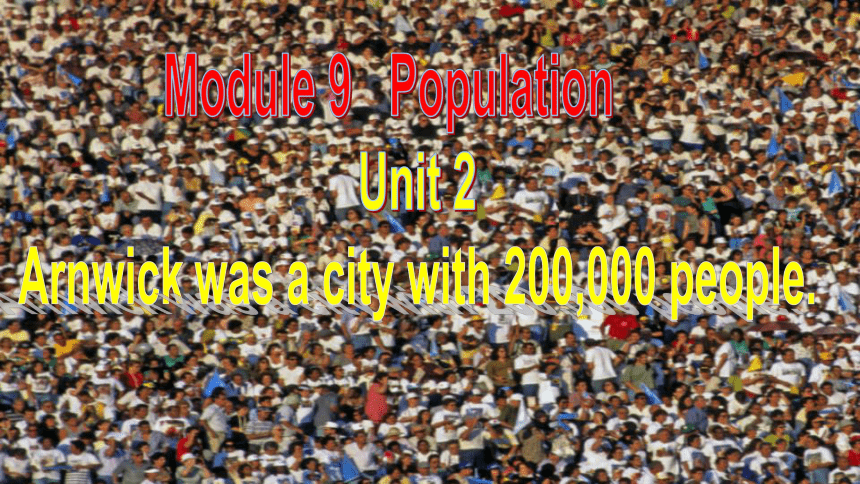 | |
| 格式 | pptx | ||
| 文件大小 | 2.8MB | ||
| 资源类型 | 教案 | ||
| 版本资源 | 外研版 | ||
| 科目 | 英语 | ||
| 更新时间 | 2023-08-30 14:28:08 | ||
图片预览

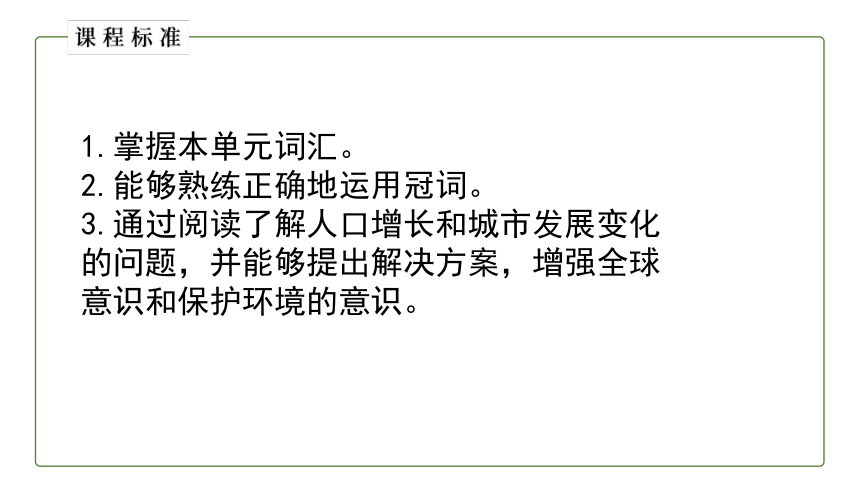
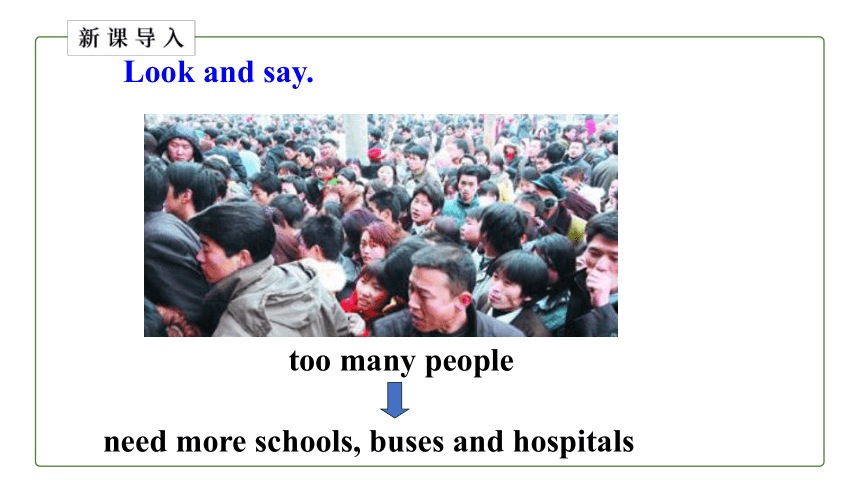
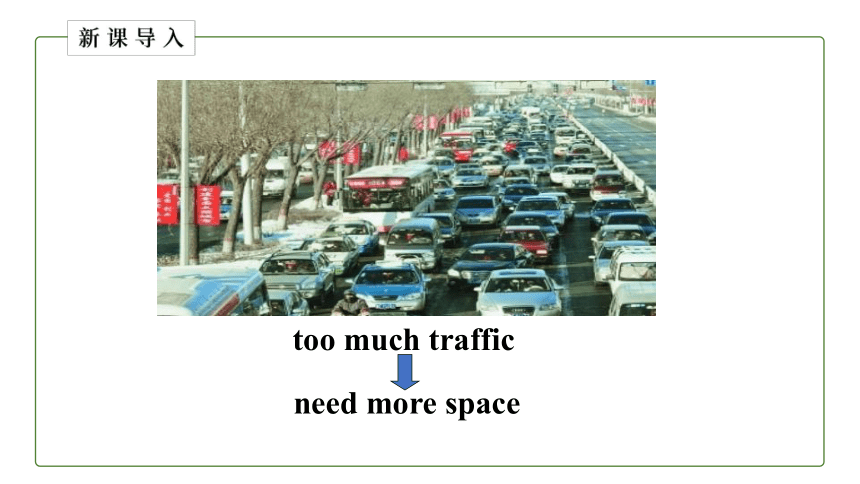
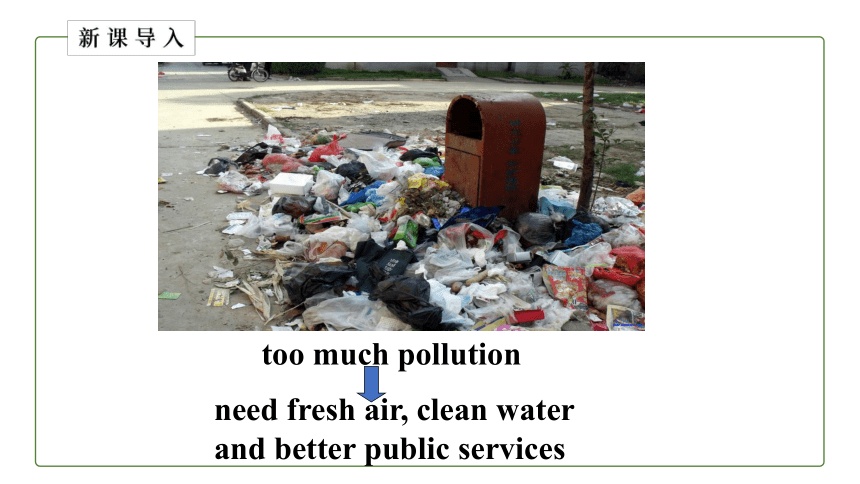
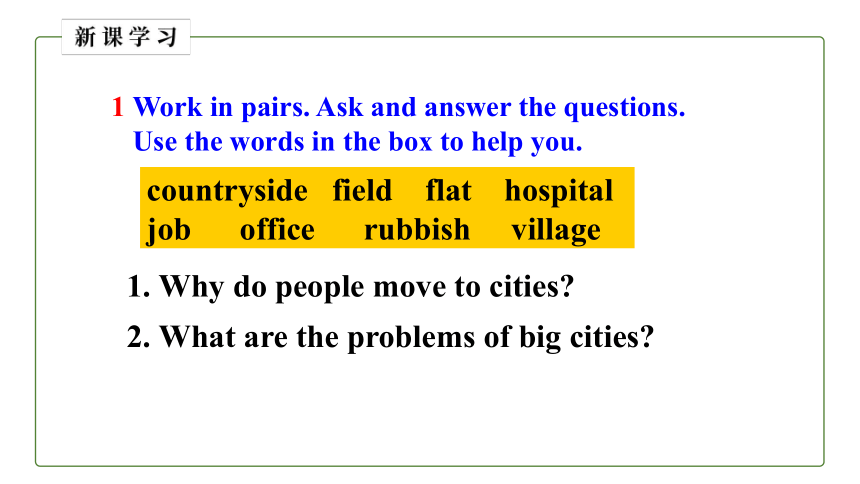
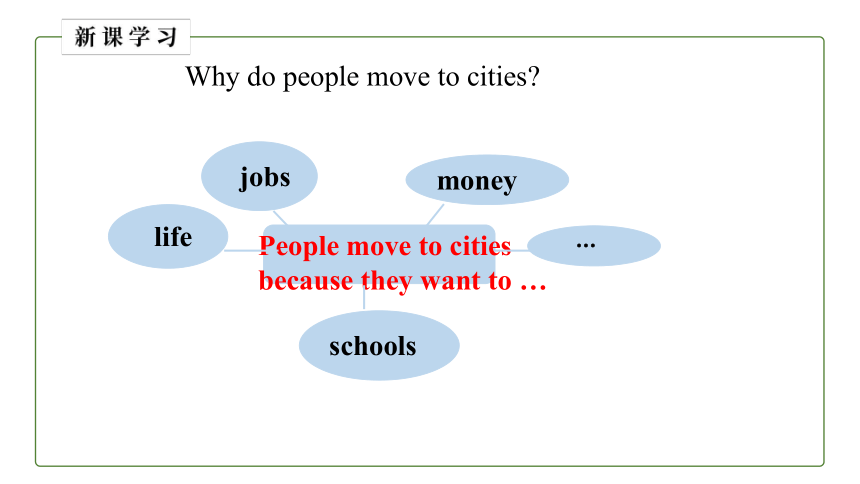
文档简介
(共19张PPT)
Unit 2
Arnwick was a city with 200,000 people.
Module 9 Population
1.掌握本单元词汇。
2.能够熟练正确地运用冠词。
3.通过阅读了解人口增长和城市发展变化的问题,并能够提出解决方案,增强全球意识和保护环境的意识。
too many people
Look and say.
need more schools, buses and hospitals
too much traffic
need more space
too much pollution
need fresh air, clean water and better public services
1. Why do people move to cities
2. What are the problems of big cities
countryside field flat hospital
job office rubbish village
1 Work in pairs. Ask and answer the questions.
Use the words in the box to help you.
Why do people move to cities
People move to cities
because they want to …
jobs
money
schools
life
…
What are the problems of big cities
Big cities have a lot of problems, such as …
traffic
rubbish
pollution
hospitals
noise
…
Fast reading.
Read and find the main idea of the passage.
The passage talks about the ________ of Arnwick.
problems
Careful reading. Read and fill in the blanks.
Parkville was a quiet __________.
Parkville became _______ of Arnwick.
New problems: It is very _______, and rubbish is also a problem.
The local school in Parkville ______ _____.
There is a lot of _______ and ________.
More things needed: schools, buses, hospitals, fresh air, clean water and ______ _______ ________, police, money …
village
part
closed down
traffic pollution
better public services
close down意思是“停工,关闭”
crowded
1 Parkville was a quiet village.
2 Arnwick was a city with 20,000 people.
3 Arnwick now has a population of more
than one million.
4 The local school in Parkville has 2,000
pupils.
5 Big cities need more money for public
services.
3 Check (√) the true sentences.
√
√
√
flat local pollution rubbish service thousand
Many towns and cities have the same problems as Arnwick. People need places to live, so the (1) ______ government has to build more (2) _______. People need better bus and train (3) _______. They also produce more (4) _______, so the government has to make more efforts to protect the city against (5) ________. As we say, a hundred people make a (6) ________ problems!
local
flats
4 Complete the passage with the correct form of
the words in the box.
services
rubbish
pollution
thousand
5 Read and check (√) the problems that exist in
your home town.
( ) Many young people want to leave the countryside
because they want to find jobs in the city.
( ) There are not enough schools and hospitals.
( ) Too much traffic brings air pollution.
( ) There is too much rubbish in the streets.
( ) There are not enough police in the city.
( ) It is difficult to get enough clean water.
√
√
√
√
Writing
6 Write down your suggestions to solve
the problems in your home town.
Problems Suggestions
Too much traffic brings air pollution.
1. It’s a good idea for government to control the number of cars.
2. We can take buses ride or bikes to go to school.
Water pollution and rubbish in the streets
1. throw, rubbish bin (垃圾桶)
2. We’d better …
3. Government should/can …
Large population
and fewer job chances
1. the number of, offer
2. It’s important for sb. to do sth.
一、a, an, the或/填空。
1. Tomorrow is _____ Teachers’ Day and we’ll
make ______ card for our English teacher.
2. The bus is running about seventy miles ___ hour.
3. Mary is interested in ______ science.
4. Some people don’t like to talk at ____ table.
5. Last night I went to_____ bed very late.
6. Don’t worry. We still have _____ little time left.
7. —Do you know _____ woman in red
—Yes, she’s a teacher of _____ university.
/
a
an
/
/
/
a
the
a
二、单项选择。
1. —Please make _____ for the old woman.
—Here you are.
A. house B. flat C. room
2. The paper factory _____ last year and the villagers
were very happy to have a better life.
A. closed off B. closed away C. closed down
3. Air ______ is a serious problem in big cities.
A. pollution B. pollute C. rubbish
4. The government needs to make ______ to protect the forest.
A. laws B. stories C. ways
5. Our block is ______ the Blue Sky Building.
A. near from B. far to C. close to
C
C
A
A
C
1.我们了解了口增长和城市发展变化的问题。
2.学习了冠词的用法。
3.了解了人口与环境类问题及解决方案。
Write down your suggestions to solve the
problems in your home town.
2. Finish the workbook.
Unit 2
Arnwick was a city with 200,000 people.
Module 9 Population
1.掌握本单元词汇。
2.能够熟练正确地运用冠词。
3.通过阅读了解人口增长和城市发展变化的问题,并能够提出解决方案,增强全球意识和保护环境的意识。
too many people
Look and say.
need more schools, buses and hospitals
too much traffic
need more space
too much pollution
need fresh air, clean water and better public services
1. Why do people move to cities
2. What are the problems of big cities
countryside field flat hospital
job office rubbish village
1 Work in pairs. Ask and answer the questions.
Use the words in the box to help you.
Why do people move to cities
People move to cities
because they want to …
jobs
money
schools
life
…
What are the problems of big cities
Big cities have a lot of problems, such as …
traffic
rubbish
pollution
hospitals
noise
…
Fast reading.
Read and find the main idea of the passage.
The passage talks about the ________ of Arnwick.
problems
Careful reading. Read and fill in the blanks.
Parkville was a quiet __________.
Parkville became _______ of Arnwick.
New problems: It is very _______, and rubbish is also a problem.
The local school in Parkville ______ _____.
There is a lot of _______ and ________.
More things needed: schools, buses, hospitals, fresh air, clean water and ______ _______ ________, police, money …
village
part
closed down
traffic pollution
better public services
close down意思是“停工,关闭”
crowded
1 Parkville was a quiet village.
2 Arnwick was a city with 20,000 people.
3 Arnwick now has a population of more
than one million.
4 The local school in Parkville has 2,000
pupils.
5 Big cities need more money for public
services.
3 Check (√) the true sentences.
√
√
√
flat local pollution rubbish service thousand
Many towns and cities have the same problems as Arnwick. People need places to live, so the (1) ______ government has to build more (2) _______. People need better bus and train (3) _______. They also produce more (4) _______, so the government has to make more efforts to protect the city against (5) ________. As we say, a hundred people make a (6) ________ problems!
local
flats
4 Complete the passage with the correct form of
the words in the box.
services
rubbish
pollution
thousand
5 Read and check (√) the problems that exist in
your home town.
( ) Many young people want to leave the countryside
because they want to find jobs in the city.
( ) There are not enough schools and hospitals.
( ) Too much traffic brings air pollution.
( ) There is too much rubbish in the streets.
( ) There are not enough police in the city.
( ) It is difficult to get enough clean water.
√
√
√
√
Writing
6 Write down your suggestions to solve
the problems in your home town.
Problems Suggestions
Too much traffic brings air pollution.
1. It’s a good idea for government to control the number of cars.
2. We can take buses ride or bikes to go to school.
Water pollution and rubbish in the streets
1. throw, rubbish bin (垃圾桶)
2. We’d better …
3. Government should/can …
Large population
and fewer job chances
1. the number of, offer
2. It’s important for sb. to do sth.
一、a, an, the或/填空。
1. Tomorrow is _____ Teachers’ Day and we’ll
make ______ card for our English teacher.
2. The bus is running about seventy miles ___ hour.
3. Mary is interested in ______ science.
4. Some people don’t like to talk at ____ table.
5. Last night I went to_____ bed very late.
6. Don’t worry. We still have _____ little time left.
7. —Do you know _____ woman in red
—Yes, she’s a teacher of _____ university.
/
a
an
/
/
/
a
the
a
二、单项选择。
1. —Please make _____ for the old woman.
—Here you are.
A. house B. flat C. room
2. The paper factory _____ last year and the villagers
were very happy to have a better life.
A. closed off B. closed away C. closed down
3. Air ______ is a serious problem in big cities.
A. pollution B. pollute C. rubbish
4. The government needs to make ______ to protect the forest.
A. laws B. stories C. ways
5. Our block is ______ the Blue Sky Building.
A. near from B. far to C. close to
C
C
A
A
C
1.我们了解了口增长和城市发展变化的问题。
2.学习了冠词的用法。
3.了解了人口与环境类问题及解决方案。
Write down your suggestions to solve the
problems in your home town.
2. Finish the workbook.
同课章节目录
- Module 1 How to learn English
- Unit 1 Let's try to speak English as much as possi
- Unit 2 You should smile at her.
- Unit 3 Language in use .
- Module 2 My home town and my country
- Unit 1 It's taller than many other buildings.
- Unit 2 Cambridge is a beautiful city in the east o
- Unit 3 Language in use .
- Module 3 Sports.
- Unit 1 Nothing is more exciting than playing tenni
- Unit 2 This year we training more carefully.
- Unit 3 Language in use .
- Module 4 Planes, ships and trains .
- Unit 1 He lives the farthest from school.
- Unit 2 What is the best way to travel.
- Unit 3 Language in use .
- Module 5 Lao She Teahouse.
- Unit 1 I wanted to see the Beijing Opera.
- Unit 2 It descibes the changes in Chinese society.
- Unit 3 Language in use .
- Module 6 Animals in danger.
- Unit 1 It allows people to get closer to them .
- Unit 2 The WWF is working hard to save them all.
- Unit 3 Language in use .
- Revision module A
- Module 7 A famous story
- Unit 1 Alice was sitting with her sister by the ri
- Unit 2 She was thinking about her cat.
- Unit 3 Language in use .
- Module 8 Accidents
- Unit 1 While the car were changing to red, a car s
- Unit 2 I was trying to pick it up when it bite me
- Unit 3 Language in use .
- Module 9 Population
- Unit 1 The population of China is about 1.37 billi
- Unit 2 Arnwick was a city with 200,000 people.
- Unit 3 Language in use .
- Module 10 The weathe
- Unit 1 It might snow.
- Unit 2 The weather is fine all year round.
- Unit 3 Language in use .
- Module 11 Way of life
- Unit 1 In China ,we open a gift later.
- Unit 2 In England, you usually drink tea with milk
- Unit 3 Language in use .
- Module 12 Help
- Unit 1 What should we do before help arrives?
- Unit 2 Stay away from windows and heavy furniture.
- Unit 3 Language in use .
- Revision module B
